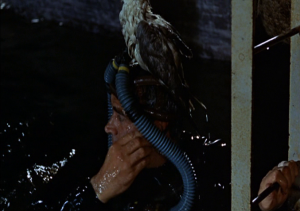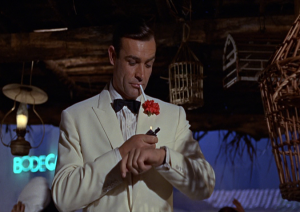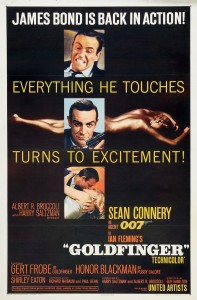 Review: One Night Only
Review: One Night Only
Goldfinger | Guy Hamilton | UK | 1964 | 110 min
Goldfinger said, “Mr. Bond, they have a saying in Chicago: ‘Once is happenstance, twice is coincidence, the third time it’s enemy action.’”
Ian Fleming, from his novel
In advance of this week’s Madfilm Meetup, I thought I’d provide a few thoughts on Goldfinger. The third entry in the long-running James Bond franchise, Goldfinger is easily one of the most popular Bond films, and perhaps one of the most essentialist takes on the silver screen’s most famous secret agent. In some ways, however, it is a more unusual entry than some may acknowledge, including one aspect which demands that the film be viewed on a big screen.
My first encounter with Goldfinger was through airings on ABC in the 1980’s, when networks edited films for television far more frequently than they do today. And I don’t just mean editing out gratuitous language, sex, and violence (though, sadly, that happened too). In some cases, brutal editorial surgery was done on these films. Case in point, ABC entirely removed the first five minutes of Goldfinger and instead began its broadcast by going straight into the titles. Like a laser cutting through gold, the network summarily robbed viewers of the pre-titles sequence—five of the most thrilling minutes of cinema I’ve ever laid eyes and ears upon.
In the pre-titles, we see much of what makes the film as a whole so memorable. We get Sean Connery, whose comfort with and confidence in the role are arguably at their peak. As does the movie itself, he blends the suave and the silly with effortless aplomb. One minute, he is removing a bird helmet from his scuba gear that he has used to swim up to a hideout undetected. Two minutes later, he’s removing the rest of his tactical gear to reveal—yep, you guessed it—a tuxedo. In between, he uses a grappling gun and an explosive belt to aid in his mission to destroy a South American heroin factory, thus giving us a little preview of the gadgetry to come. Speaking of previews, we also get one of Ken Adam’s signature production design. Guy Hamilton provides outstanding direction, with cinematographer Ted Moore and editor Peter Hunt working in concert to give us not one but two crisp and well-staged action sequences within a scant five minutes. And from that very first note of the theme music, the importance of John Barry’s score to creating an atmosphere of excitement cannot be overstated.
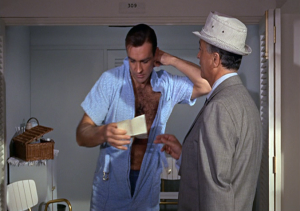 For its many indisputably great qualities, there are also a few oddities about, and flaws with, the film. For example, the initial Bond films can be seen to form a sort of serial narrative detailing James Bond’s battle against the forces of S.P.E.C.T.R.E., headed by Bond’s arch-nemesis Ernst Stavro Blofeld. Dr. No and From Russia with Love do a fair amount of setup in this respect. Goldfinger plays as an interruption to this overarching conflict, for neither the villain nor the film have anything to do with that connective narrative tissue. Connery’s confidence in the role also goes too far, clearly thinking that he can get away with wearing a blue beach onesie and make it work. (Alright, he manages.)
For its many indisputably great qualities, there are also a few oddities about, and flaws with, the film. For example, the initial Bond films can be seen to form a sort of serial narrative detailing James Bond’s battle against the forces of S.P.E.C.T.R.E., headed by Bond’s arch-nemesis Ernst Stavro Blofeld. Dr. No and From Russia with Love do a fair amount of setup in this respect. Goldfinger plays as an interruption to this overarching conflict, for neither the villain nor the film have anything to do with that connective narrative tissue. Connery’s confidence in the role also goes too far, clearly thinking that he can get away with wearing a blue beach onesie and make it work. (Alright, he manages.)
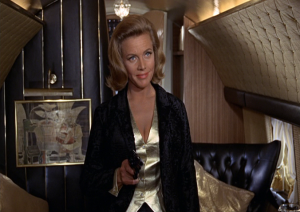 Stranger than these, however, is that despite Peter Hunt’s editorial prowess, one of the shortest Bond films actually manages to have something of a pacing issue. While it’s a common occurrence of the series that Bond be captured by the villain, Bond spends almost half the film as Goldfinger’s prisoner. There are obviously some terrific scenes in the latter half of the film, like the introduction of Pussy Galore (Honor Blackman) or Goldfinger’s (Gert Frobe) masterful monologue about miracles achieved “in every field of human endeavor, EXCEPT CRIME!” but one can’t help but feel that Bond is merely along for the ride here, instead of making things happen. Thus, the momentum of the first 50 minutes is somewhat arrested.
Stranger than these, however, is that despite Peter Hunt’s editorial prowess, one of the shortest Bond films actually manages to have something of a pacing issue. While it’s a common occurrence of the series that Bond be captured by the villain, Bond spends almost half the film as Goldfinger’s prisoner. There are obviously some terrific scenes in the latter half of the film, like the introduction of Pussy Galore (Honor Blackman) or Goldfinger’s (Gert Frobe) masterful monologue about miracles achieved “in every field of human endeavor, EXCEPT CRIME!” but one can’t help but feel that Bond is merely along for the ride here, instead of making things happen. Thus, the momentum of the first 50 minutes is somewhat arrested.
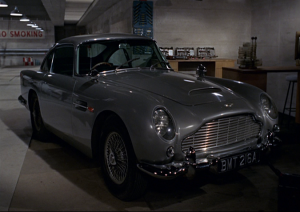 As I alluded to at the beginning of this piece, I’ve found that this pacing issue is isolated to viewing Goldfinger on a small screen. View it on the big screen, and this pacing issue is mitigated, if not entirely eliminated, by the barrage of Bondian iconography that the film introduces or enhances. The gorgeous Aston Martin DB5 and all of the exciting extras Q saw fit to install, along with Q’s lab for that matter. Robert Brownjohn’s title sequence set to Shirley Bassey’s truly awesome vocals (Brownjohn being as important to the look of Bondian titles as series stalwart Maurice Binder was). The laser table sequence. The physically imposing henchman with that extra edge—in Oddjob’s case, a head-severing hat. All of these and so much more combine to give us a true Bond blockbuster.
As I alluded to at the beginning of this piece, I’ve found that this pacing issue is isolated to viewing Goldfinger on a small screen. View it on the big screen, and this pacing issue is mitigated, if not entirely eliminated, by the barrage of Bondian iconography that the film introduces or enhances. The gorgeous Aston Martin DB5 and all of the exciting extras Q saw fit to install, along with Q’s lab for that matter. Robert Brownjohn’s title sequence set to Shirley Bassey’s truly awesome vocals (Brownjohn being as important to the look of Bondian titles as series stalwart Maurice Binder was). The laser table sequence. The physically imposing henchman with that extra edge—in Oddjob’s case, a head-severing hat. All of these and so much more combine to give us a true Bond blockbuster.
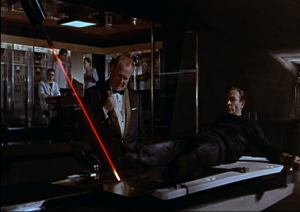 People who know me know how much I love the world of James Bond, which is why, in advance of the release of SPECTRE later this year, I will be posting articles on each of the films here at the Madison Film Forum. We hope you’ll look for those starting in October. Until then, we hope you’ll join us for the rare treat of a classic James Bond film on the big screen. If Dr. No was happenstance and From Russia with Love was coincidence, then Goldfinger was dynamite box-office action indeed. More than fifty years after its release, it’s the film…the film with the midas touch.
People who know me know how much I love the world of James Bond, which is why, in advance of the release of SPECTRE later this year, I will be posting articles on each of the films here at the Madison Film Forum. We hope you’ll look for those starting in October. Until then, we hope you’ll join us for the rare treat of a classic James Bond film on the big screen. If Dr. No was happenstance and From Russia with Love was coincidence, then Goldfinger was dynamite box-office action indeed. More than fifty years after its release, it’s the film…the film with the midas touch.
